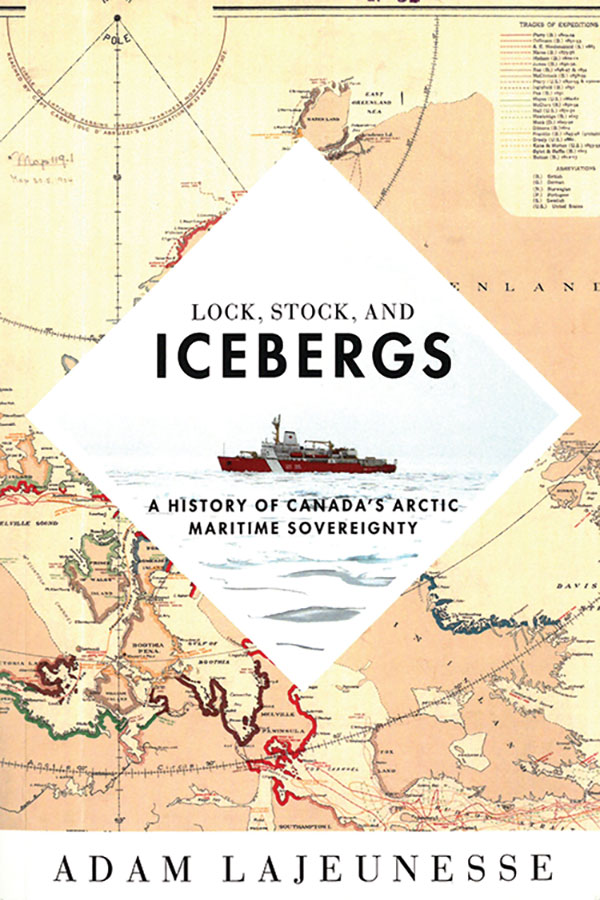by Brian Smith
Parks Canada, Winnipeg
|
Adam Lajeunesse, Lock, Stock, and Icebergs: A History of Canada’s Arctic Maritime Sovereignty. Vancouver: University of British Columbia Press, 2016, 404 pages. ISBN 978-0-7748-3109-3, $34.95 (paperback)
 In 2017, historian Adam Lajeunesse’s historical documentary book, Lock, Stock and Icebergs: A History of Canada’s Arctic Maritime Sovereignty, won J. W. Dafoe Book Prize, which is award-ed annually to the best book on Canada, Canadians, and/or Canada’s place in the world published in the previous calendar year. The prize, awarded in Winnipeg last May, carries a purse of $10,000, and the Lajeunesse was selected from a field of thirty-eight submissions. To this reviewer, it comes as no surprise, for this is a truly well-crafted, meticulously researched, and exceptionally well-written work. Notably, it is also an exceptionally timely volume, for Canada faces continuing challenges within the longstanding dispute over whether the North-west Passage as a trade route is in Canadian or international waters. Many countries, and particularly the United States do not recognize Canada’s claim to sovereignty over the Northwest Passage and the lands and waters of the Arctic Archipelago that were transferred to Canada by a British Imperial Order-in-Council in 1880.
In 2017, historian Adam Lajeunesse’s historical documentary book, Lock, Stock and Icebergs: A History of Canada’s Arctic Maritime Sovereignty, won J. W. Dafoe Book Prize, which is award-ed annually to the best book on Canada, Canadians, and/or Canada’s place in the world published in the previous calendar year. The prize, awarded in Winnipeg last May, carries a purse of $10,000, and the Lajeunesse was selected from a field of thirty-eight submissions. To this reviewer, it comes as no surprise, for this is a truly well-crafted, meticulously researched, and exceptionally well-written work. Notably, it is also an exceptionally timely volume, for Canada faces continuing challenges within the longstanding dispute over whether the North-west Passage as a trade route is in Canadian or international waters. Many countries, and particularly the United States do not recognize Canada’s claim to sovereignty over the Northwest Passage and the lands and waters of the Arctic Archipelago that were transferred to Canada by a British Imperial Order-in-Council in 1880.
The book’s title is taken from an assertion by Brian Mulroney. Reportedly, as he directed Ronald Reagan’s attention to the Canadian Arctic region on a desk globe, he stated, “Ron that’s ours. We own it lock, stock, and icebergs.” Although President Reagan was perhaps sympathetic to his friend’s summation of the century-old Canadian policy position on Canada’s claim to Arctic Sovereignty, it was not officially recognized then, nor has it been by successive American administrations leading up to the present day.
Lajeunesse details the decades of negotiations and debates drawing upon archival material from Canada and the United States, some of it recently declassified, to weave together and present this fascinating history. The long-standing call of the historian—that to know, and more importantly, to understand where we are going to, is only possible if we know where we are from—has rarely been trumpeted so well. This book is hard to put down and one that will be eagerly returned to. Canada’s Arctic sovereignty is a premise that depended on early whaling licences doled out by the federal government, and on remotely based, scarlet-clad RCMP who were assigned from pre-First World War to the more recent international cold war tensions. Here are submarines, freighters and coast guard cutters, military occupations of floating ice islands, environmental wrangling, and backroom bureaucratic secrets—even the problematic prosecution murder on the high seas! This book has it all.
Throughout the book, within a historical backdrop Lajeunesse examines the debate around Canada’s Maritime policy and its claims to jurisdiction and sovereignty in the Arctic, which have on one hand been described as ‘schizophrenic and disastrous’ and, on the other, ‘a careful deliberate and ultimately successful program.’ The book succeeds because its author provides solid evidence where both views could, and have applied to the subject throughout the last century.
The book ends with the chapter, “Unfinished Business,” which takes the reader up to glimpses of events in 2015. However, the saga is ongoing, as political events in 2016 and 2017 affecting Canada’s position in the Arctic continue to unfold. As the Arctic warms, fueling predictions of more viable shipping routes in the world polar regions by mid-century, the story of Canada’s jurisdiction and sovereignty in this region are far from over. Lock, Stock, and Icebergs presents Canadians and others with a much clearer insight into what Justin Trudeau’s government has actually done in mid-August in 2017, by naming Tallurutip Imanga (approximately 110,000 square kilometers of Arctic Ocean encompassing Lancaster Sound) a National Marine Conservation Area. There are many ways to travel through the Northwest Passage west of Somerset Island, but Lancaster Sound is the only way in or out of the eastern end.
This book has great potential for a fascinating sequel, and if Lajeunesse is writing it, I’m reading it.
“In 1969, the SS Manhattan, an American oil tanker, sailed the Northwest Passage. Its voyage sparked some of the first debates in Canada regarding Arctic sovereignty.
Source: Associated Press
We thank Clara Bachmann for assistance in preparing the online version of this article.
We thank S. Goldsborough for assistance in preparing the online version of this article.
Page revised: 31 March 2021